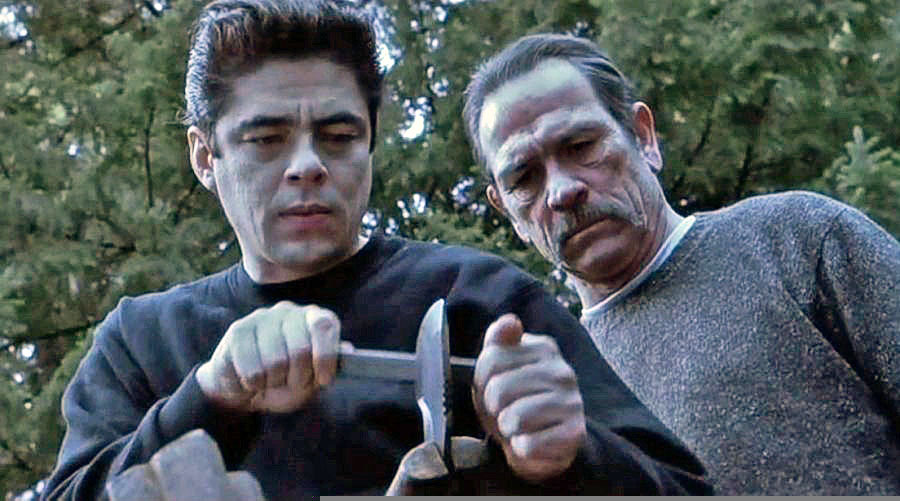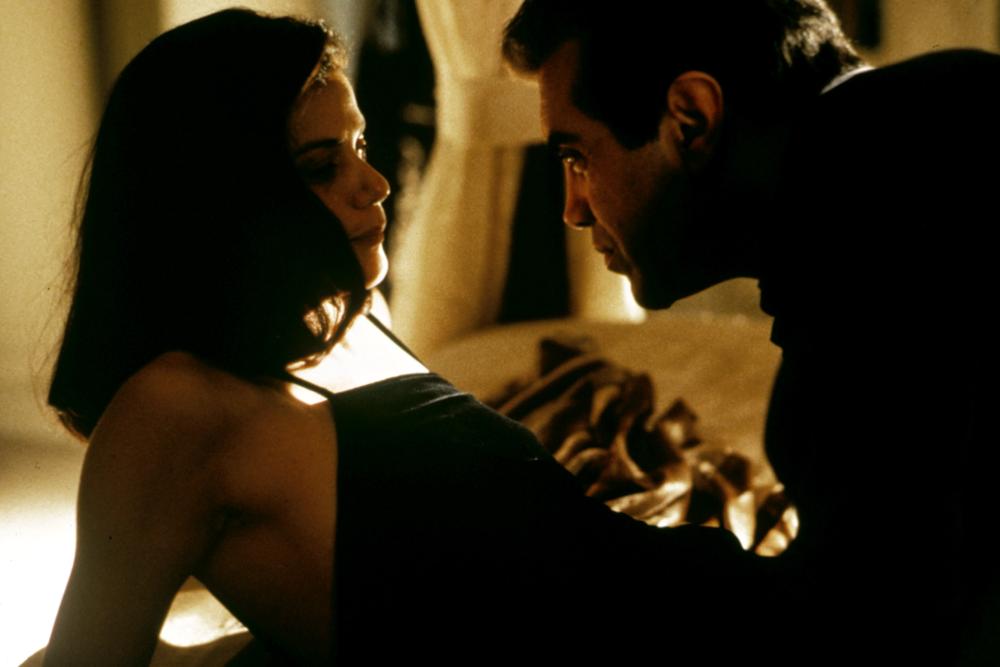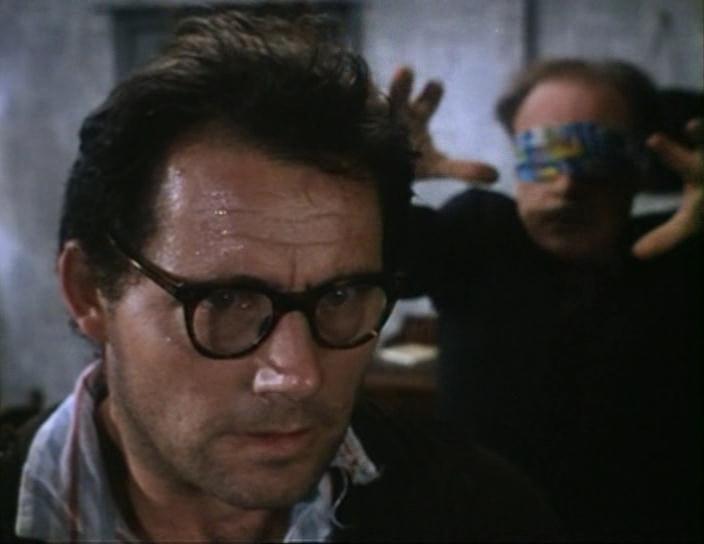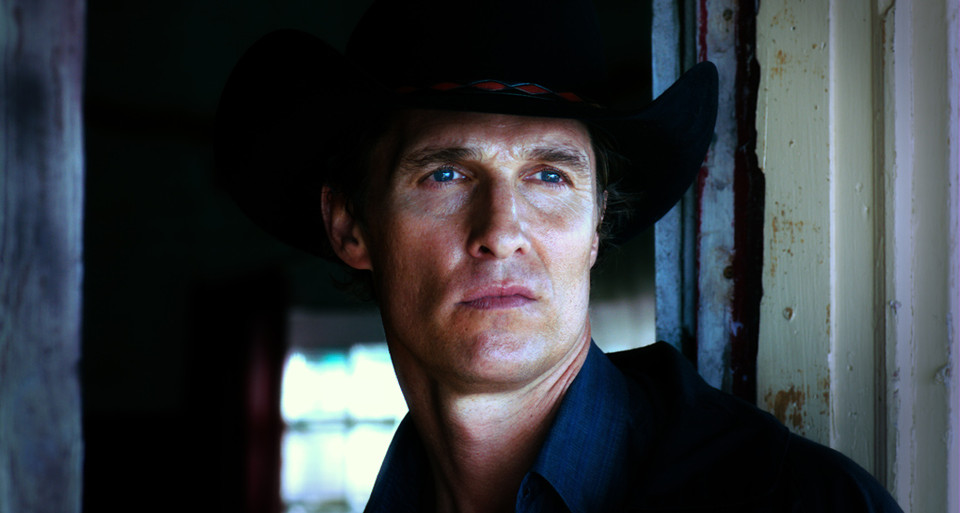13. The Hunted (2003)

Friedkin teams once again with Tommy Lee Jones, and thankfully in a marginally better picture, as L.T. Bonham, a instructor of military survival and combat training, and also a gifted tracker, who pairs up with Abby Durrell (Connie Nielsen), Assistant Special Agent for an FBI task force. Bonham and Durrell must hunt down a dangerous trained assassin named Aaron Hallam (Benicio Del Toro), a former U.S. Army Sergeant First Class.
While rather redundant of the Rambo films, what The Hunted lacks in strong character development and nuance it more than makes up for in tension-mounting narrative momentum and soaring set pieces. Fans of clever crime-thrillers, take note.
12. Jade (1995)

Slyly stepping into erotic thriller territory, Friedkin channels a little of the Brian De Palma mojo while pulling a surprising performance from Linda Fiorentino in Jade. Sure, upon its initial release the film garnered mostly negative reactions (including a few Golden Raspberry nominations), this sordid tale of sex, and criminal corruption is a guilty pleasure that’s aged rather well, and, no surprise here, has become something of a cult classic.
District Attorney David Corelli (David Caruso) is on the case of a murdered art deal of considerable fame, and the key suspect just so happens to be David’s steamy ex-lover, one Katrina Gavin (Fiorentino). Katrina is a psychologist who’s current squeeze just so happens to be David’s old BFF, Matt (Chazz Palminteri), and does a twisty web of dark secrets, far-reaching repercussions, and kinky sex lurk in the shadows? You bet your tanned and weather-stripped keister it does!
11. The Brink’s Job (1978)

Peter Falk gives a great performance as Tony Pino, a 1950s Boston-based petty thief who’s fresh from the pen and prepared to mastermind the robbery of the century. Along with his partner in crime, Joe McGinnis (Peter Boyle), and their ragtag gang of five reliable associates, they set their considerable sights on Brink’s main office and a kitty of over $2 million.
Based off the real-life Great Brink’s Robbery, with a game cast that also includes Warren Oates, Gena Rowlands, Paul Sorvino, and Sheldon Leonard as J. Edgar Hoover, this is a crime caper that manages to be funny, offbeat, richly detailed, well-written, and packs a few thrills as it thrums along.
10. The Night They Raided Minsky’s (1968)

This light hearted musical comedy from Friedkin crested a nostalgic wave of Hollywood films that toasted and romanticized the Roaring Twenties (1968’s Funny Girl and 1968’s Isadora are two other popular examples from the same year), here fictionalizing the inspired invention of the striptease at Minsky’s Burlesque in New York’s Lower East Side in 1925.
With a lovely lead performance from Britt Ekland, in what she’s said many times is her favorite film role, as Rachel Schpitendavel, she’s a naïve gal from the sticks, raised in a rather puritanical Amish home, her flight to the Big Apple to be a dancer is her dream coming true.
She’s soon showing her steps, which are innocently derived from the Biblical stories she was reared on, to Billy Minsky (Elliott Gould), who wants to exploit her routine to chasten the critics of his theater––specifically a repressed moral crusader named Vance Fowler (Denholm Elliott).
There’s much to admire in The Night They Raided Minsky’s, particularly from Friedkin, who gets to display a level of artistry and creativity (specifically in his slick use faux documentary and pseudo-1920s-newsreel footage) that was largely absent from his previous film, the aforementioned Good Times. This is an enjoyably offbeat film, that manages to be both tender and deliriously unbalanced all at once.
9. Cruising (1980)

Certainly one of the director’s most misunderstood and most controversial films, Cruising presents an elaborate and intense psychological thriller framed amidst the violent S&M clubs in New York City. The gay club scene that’s presented here is one awash with irredeemable characters, including an ambivalent Al Pacino as Detective Steve Burns, who goes undercover in this leather attired subculture in the hopes of capturing a psychopathic serial killer who’s viciously murdering gay men.
Charged with homophobic representations of the queer community––and Cruising certainly does seem to celebrate the idea that the gay men being shown in this world are drawn to violence––it’s still questionable that this wasn’t on the minds of the filmmakers.
Friedkin, after all, did give us the ahead-of-its-time pro-queer cause célèbre 1970 film The Boys in the Band (further on down this list), and seems more concerned in telling an upsetting tale of one man’s––Pacino’s––struggle with his own sexual identity and damaged masculinity. Cruising is not an easy film to penetrate as it offers a variegated viewing experience, and that’s not necessarily a bad thing.
As Steve spends more time on the trail of the killer and losing himself in the S&M club scene he finds much that he enjoys there, and this distances him from his girlfriend, Nancy (Karen Allen). Steve’s deep cover is further confused due to the the police force’s homophobia, reflecting sick behaviour not just from the fictionalized representation of the gay community, but from law enforcement, and the larger society as well. Cruising represents a dark version of America, and a very cynical one, and the ending, which is shrewdly uncertain, further underscores these themes.
Unsettling, explicit, worthy of a reappraisal, and constantly indicative of Friedkin’s intelligence, sparse technique, and influence (serial killer films that would follow, such as Silence of the Lambs, Se7en, etc., owe Cruising a fair deal), this is a dark and disturbing nightmare that would never be made today.
8. The Birthday Party (1968)

The Birthday Party, “a film of which I’m proud”, Friedkin has happily extolled, is based on an unpublished screenplay by Harold Pinter, which he adapted from his own play about two mobsters (Patrick Magee, Sydney Tafler) tormenting a deserter (Robert Shaw) to madness at a seaside resort.
As with Pinter’s finest work, The Birthday Party displays a stylized yet sharp flair, pregnant with the promise of violence, with a nimble dance of horror and humor for good measure.
“The cast played [The Birthday Party] to perfection,” Friedkin says, adding rather modestly: “With the exception of an occasional over-the-top directorial flourish, I think I captured Pinter’s world… The time I spent with [Pinter] and the many conversations we had were the most invaluable and instructive of my career.”
Highly recommended.
7. Killer Joe (2011)

A twisted, lurid, and joyfully deranged black comedy with an ominous Southern Gothic luster, Killer Joe delights in foul-mouthed men and women full of dysfunction and every conceivable form of incompetence.
Matthew McConaughey is the eponymous “Killer” Joe Cooper, a questionable cop who leads a double life as a hit man who all too easily agrees to kill the despised mother of Chris Smith (Emile Hirsch). Chris is a drug dealer, who offers Joe as payment the opportunity to “date” his sister Dottie (Juno Temple).
Killer Joe isn’t the type of film to sit well with many viewers, the lowlifes on screen are deliberate and devious caricatures, the sex, violence, and inhumanity they display is arguably off the charts––the film was granted an NC-17 rating in the US––and as a result this kind of cruel comedy detracts as many as it delights. But that said, Killer Joe, being Friedkin’s first film after a five year absence, clearly shows that he’s not lost his touch or his ability to provoke and indulge on his own terms.